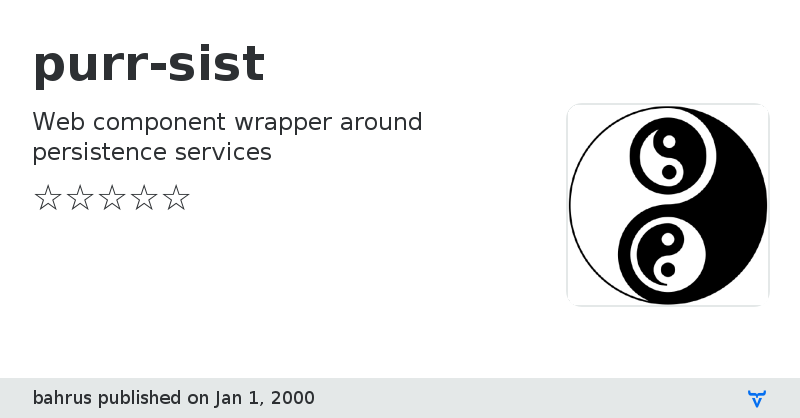purr-sist - Vaadin Add-on Directory
Web component wrapper around persistence services

 # purr-sist
purr-sist-* are web component wrappers around various services used to persist (history.)state.
What follows purr-sist- indicates where the state is persisted.
For example, purr-sist-myjson persists state to the [myjson.com](http://myjson.com/) api service. The service allows anyone to save and update a JSON document, with zero setup steps. See discussion below about the pro's and significant con's of this service.
purr-sist-idb persists state to the local indexed db for offline storage (and potentially cross window state management).
**NB**: Quite a bit of the functionality described here overlaps significantly with the slightly better known [Polymer data elements](https://www.webcomponents.org/element/@polymer/app-storage), which I remembered about recently. At this point, there's no doubt those components support useful features not found here for now (like orchestrating data moving as the user's status switches between offline and online mode).
## Syntax Reference
## Basic Syntax
purr-sist has two modes:
```html
# purr-sist
purr-sist-* are web component wrappers around various services used to persist (history.)state.
What follows purr-sist- indicates where the state is persisted.
For example, purr-sist-myjson persists state to the [myjson.com](http://myjson.com/) api service. The service allows anyone to save and update a JSON document, with zero setup steps. See discussion below about the pro's and significant con's of this service.
purr-sist-idb persists state to the local indexed db for offline storage (and potentially cross window state management).
**NB**: Quite a bit of the functionality described here overlaps significantly with the slightly better known [Polymer data elements](https://www.webcomponents.org/element/@polymer/app-storage), which I remembered about recently. At this point, there's no doubt those components support useful features not found here for now (like orchestrating data moving as the user's status switches between offline and online mode).
## Syntax Reference
## Basic Syntax
purr-sist has two modes:
```html
View on GitHub
purr-sist version 0.0.0
### Dependencies
purr-sist version 0.0.1
### Dependencies
* xtal-latx#0.0.44
purr-sist version 0.0.2
### Dependencies
* xtal-latx#0.0.44
purr-sist version 0.0.3
### Dependencies
* xtal-latx#0.0.44
purr-sist version 0.0.4
### Dependencies
* xtal-latx#0.0.44
purr-sist version 0.0.5
### Dependencies
* xtal-latx#0.0.44
purr-sist version 0.0.6
### Dependencies
* xtal-latx#0.0.44
purr-sist version 0.0.7
### Dependencies
* xtal-latx#0.0.44
purr-sist version 0.0.8
### Dependencies
* xtal-latx#0.0.44
purr-sist version 0.0.10
### Dependencies
* xtal-latx#0.0.46
purr-sist version 0.0.9
### Dependencies
* xtal-latx#0.0.46
purr-sist version 0.0.11
### Dependencies
* xtal-latx#0.0.46
purr-sist version 0.0.12
### Dependencies
* xtal-latx#0.0.46
purr-sist version 0.0.13
### Dependencies
* xtal-latx#0.0.46
purr-sist version 0.0.14
### Dependencies
* xtal-latx#0.0.46
purr-sist version 0.0.15
### Dependencies
* xtal-latx#0.0.46
purr-sist version 0.0.16
### Dependencies
* xtal-latx#0.0.46
purr-sist version 0.0.17
### Dependencies
* xtal-latx#0.0.46
purr-sist version 0.0.18
### Dependencies
* xtal-latx#0.0.46
purr-sist version 0.0.19
### Dependencies
* xtal-latx#0.0.46
purr-sist version 0.0.20
### Dependencies
* xtal-latx#0.0.46
purr-sist version 0.0.21
### Dependencies
* xtal-latx#0.0.46
purr-sist version 0.0.22
### Dependencies
* xtal-latx#0.0.46
purr-sist version 0.0.23
### Dependencies
* xtal-latx#0.0.46
purr-sist version 0.0.24
### Dependencies
* xtal-latx#0.0.46
purr-sist version 0.0.25
### Dependencies
* xtal-latx#0.0.46
purr-sist version 0.0.26
### Dependencies
* xtal-latx#0.0.82
purr-sist version 0.0.27
### Dependencies
* xtal-latx#0.0.82
purr-sist version 0.0.28
### Dependencies
* xtal-latx#0.0.82
purr-sist version 0.0.29
### Dependencies
* xtal-latx#0.0.82
purr-sist version 0.0.30
### Dependencies
* xtal-latx#0.0.82
purr-sist version 0.0.31
### Dependencies
* xtal-latx#0.0.82
purr-sist version 0.0.32
### Dependencies
* xtal-latx#0.0.82
purr-sist version 0.0.33
### Dependencies
* xtal-latx#0.0.85
* idb-keyval#3.1.0
purr-sist version 0.0.34
### Dependencies
* xtal-latx#0.0.85
* idb-keyval#3.1.0
purr-sist version 0.0.35
### Dependencies
* xtal-latx#0.0.85
* idb-keyval#3.1.0
purr-sist version 0.0.36
### Dependencies
* xtal-latx#0.0.85
* idb-keyval#3.1.0
purr-sist version 0.0.37
### Dependencies
* xtal-element#0.0.42
* idb-keyval#3.1.0
purr-sist version 0.0.38
### Dependencies
* xtal-element#0.0.42
* idb-keyval#3.1.0
purr-sist version 0.0.39
### Dependencies
* xtal-element#0.0.45
* idb-keyval#3.2.0
purr-sist version 0.0.40
### Dependencies
* xtal-element#0.0.48
* idb-keyval#3.2.0
purr-sist version 0.0.41
### Dependencies
* xtal-element#0.0.48
* idb-keyval#3.2.0
purr-sist version 0.0.42
### Dependencies
* xtal-element#0.0.48
* idb-keyval#3.2.0
purr-sist version 0.0.43
### Dependencies
* xtal-element#0.0.48
* idb-keyval#3.2.0
purr-sist version 0.0.44
### Dependencies
* xtal-element#0.0.48
* idb-keyval#3.2.0
purr-sist version 0.0.45
### Dependencies
* xtal-element#0.0.48
* idb-keyval#3.2.0
purr-sist version 0.0.46
### Dependencies
* xtal-element#0.0.48
* idb-keyval#3.2.0
purr-sist version 0.0.47
### Dependencies
* xtal-element#0.0.48
* idb-keyval#3.2.0
purr-sist version 0.0.48
### Dependencies
* xtal-element#0.0.48
* idb-keyval#3.2.0
purr-sist version 0.0.49
### Dependencies
* xtal-element#0.0.48
* idb-keyval#3.2.0
purr-sist version 0.0.50
### Dependencies
* xtal-element#0.0.48
* idb-keyval#3.2.0
purr-sist version 0.0.51
### Dependencies
* xtal-element#0.0.54
* idb-keyval#3.2.0
purr-sist version 0.0.52
### Dependencies
* xtal-element#0.0.56
* trans-render#0.0.106
* idb-keyval#3.2.0
purr-sist version 0.0.53
### Dependencies
* xtal-element#0.0.57
* trans-render#0.0.107
* idb-keyval#3.2.0
purr-sist version 0.0.54
### Dependencies
* xtal-element#0.0.58
* trans-render#0.0.110
* idb-keyval#3.2.0
purr-sist version 0.0.55
### Dependencies
* xtal-element#0.0.58
* trans-render#0.0.110
* idb-keyval#3.2.0
purr-sist version 0.0.56
### Dependencies
* xtal-element#0.0.58
* trans-render#0.0.110
* idb-keyval#3.2.0
purr-sist version 0.0.57
### Dependencies
* xtal-element#0.0.58
* trans-render#0.0.110
* idb-keyval#3.2.0